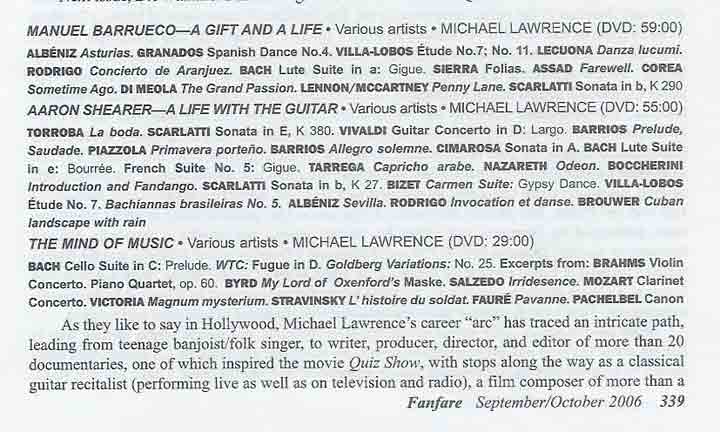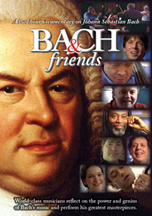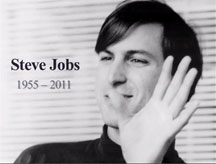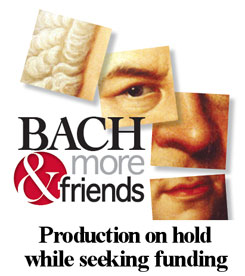manuelpress
Fanfare Classical Music Reviews Magazine has reviewed three of Michael Lawrence Films' productions. Below is the review by columnist Robert Schulslaper.
Fanfare Classical Music Magazine Reviews, Sept/Oct, 2006
Manuel Barrueco, a Gift and a Life
Aaron Shearer: A Life With The Guitar
The Mind of Music
As they like to say in Hollywood, Michael Lawrence's career arc has traced an intricate path, leading from teenage banjoist/folk singer, to writer, producer, director, and editor of more than 20 documentaries, one of which inspired the movie Quiz Show, with stops along the way as a classical guitar recitalist (performing live as well as on television and radio), a film composer of more than a dozen scores, and an author of many film and television treatments. He is a graduate of the first guitar class at the Peabody Conseratory, and therefore had close contact with two of his subjects, guitarist Manuel Barrueco and teacher Aaron Shearer. Both are renowned in the classical guitar world, and their life stories enliven these fine films.
Manuel Barrueco, a Gift and a Life, is an intimate introduction to the life and art of an outstanding virtuoso who has suffered from the political upheavals in his native Cuba, but who has triumphed over adversity to achieve his deserved success. Barrueco is revealed to be a shy, somewhat reserved and thoughtful man, who nonetheless has firm artistic convictions, and can express those ideals convincingly in performance. There are many excellent musical examples in the film, traversing a repertoire ranging from Bach to The Beatles, and including Lecuona, Scarlatti, Villa Lobos, Albeniz, Granados and Sierra, among others, as well as sincere tributes to Barrueco from his equally celebrated peers, Elliot Fisk, David Tanenbaum, David Russell, the Assad brothers, and Al Di Meola. Former EMI producer Simon Woods refers to “the art that conceals art†to describe Barrueco’s playing, and the other speakers essentially amplify this idea: Barrueco is a patrician, elegant exponent, technically superb, coloristically gifted, lyrical, self-effacing, but intensely musical and communicative. Barrueco's playing throughout is beautiful and inspiring, as are his thoughts about music: "For me, music is about feelings...it's about form, it's about traveling to different countries, to different times...but I think most of all, for me, it's just about what it's like to be human, what it feels like to be human. To me, that's what music is about."
In addition to Barrueco's performances, the playing of the Assad brothers, Al Di Meola and David Russell is a very enjoyable part of the film. In a charming vignette, five guitarists are shown relaxing and playing at Barrueco's home. After some exciting guitar wizardry by the Assad brothers, and bits by Barrueco and Russell, the latter demonstrates his unusual ability to play the guitar with his nose and tongue, and the five guitarists play together on one instrument.(Who says classical musicians are stuffy?) The visit concludes with Sergio Assad playing a beautiful duet with Barrueco, Farewell, that compliments the sad story of Barrueco's estrangement from Cuba that's interspersed with the music.
Aaron Shearer was Manuel Barrueco's teacher (Michael Lawrence was also one of his students), and in Shearer's opinion, Barrueco is the greatest guitarist performing today (quite a compliment). Shearer has taught many guitarists who later became famous, and in David Tanenbaum's words, "Ultimately, it may be who you produce after a lifetime of teaching that really defines what you've done. It may not be the method books you write, but the players that you create, and no one has created anywhere near the kind of players that Shearer has." (Tanenbaum is a prolific recording artist and Chairman of the Guitar Department at The San Francisco Conservatory of Music.) To Julian Gray, (a guitarist and member of Peabody's faculty), "Shearer changed the way that people thought about the guitar. It's a very big accomplishment to change the discourse of an instrument, the way that he did." Shearer apparently is a kind, but firm teacher, highly analytical, who even in retirement continues to probe the secrets of guitar technique. He's dedicated much of his life to the guitar, from childhood on, and his students obviously thrived under his tutelege. He too, like Barrueco, had to overcome hardships, first poverty, and then musical isolation and the lack of properly systematized instruction to achieve his goal. A devasting remark by his idol, Segovia, regarding Shearer's efforts to produce a comprehensive guitar method, would have crushed a less devoted seeker, but Shearer perservered, ultimately being vindicated by the great success of his instruction books. Aaron Shearer, A Life with the Guitar, like Manuel Barrueco, a Gift and a Life, presents many beautiful selections, some performed by Barrueco, and others by a collection of groups and soloists. I especially enjoyed Barrueco in Scarlatti (Sonatas in E, K.380 and B minor, K.27) and Nazareth (Odeon), and the Aurora Guitar Quartet's polished playing of Morena-Torroba's La Boda, Bizet's Gypsy dance from Carmen, and Brouwer's Cuban landscape with rain. La boda opens the program, and is enhanced by innovative camera work: I can't recall seeing a more sophisticated visual adjunct to a musical performance.
Both documentaries offer revealing biographical portraits, and should please anyone who is curious about the lives and personalities of prominent musicians and teachers. Of course, both films should be required viewing for students and aficionados of the classical guitar. I have one complaint, perhaps not a fair one, which is that the music can only be heard in the context of the film. In other words, any voice overs will be repeated with the music during subsequent auditions. I say unfair, because Michael Lawrence countered this observation by explaining that he set out to make documentaries, not concert fiilms, and I can't really criticize him for achieving his aim. I'm just expressing my wish to have had the performances available on a separate track.
The Mind of Music explores music's place in the universe and in the life of humanity. Musical luminaries Yehudi Menuhin, George Rochberg and Gunther Schuller air their views, and also discuss the compositional urge and process. Dr. Lewis Thomas and musicologist Eugene Helm add their thoughtful comments, and well played musical interludes speak witout words about music’s subtle power. A Bach prelude from one of his cello suites opens and closes the film, it's sonorous majesty bestowing intimations of higher realms. In between, music by Brahms, Stravinsky, Faure, Salzedo, Mozart, Byrd, Pachelbel, and Victoria plays to refresh the ears and soothe the soul. Although I agree that music is miraculous, mysterious and inherently human (ideas vividly expressed in the film), I don't think our enjoyment of music has to be overburdened with profound “meaning†to be valid, nor do I necessarily believe that we vibrate with the universe when we play or sing (although on some level, perhaps we do), but anyone who loves music should entertain such noble speculations, if only for the length of the film. I find The Mind of Music to be a very well constructed half hour, wise without being didactic or pompous, and a stimulant to thought.
Michael Lawrence has used his knowledge of music, and his skill as a film maker to give us three documentaries that will amply reward an interested viewer, and I look forward to whatever productions he may send my way.













